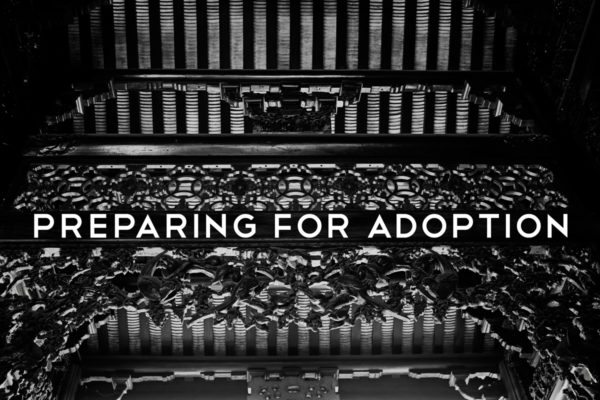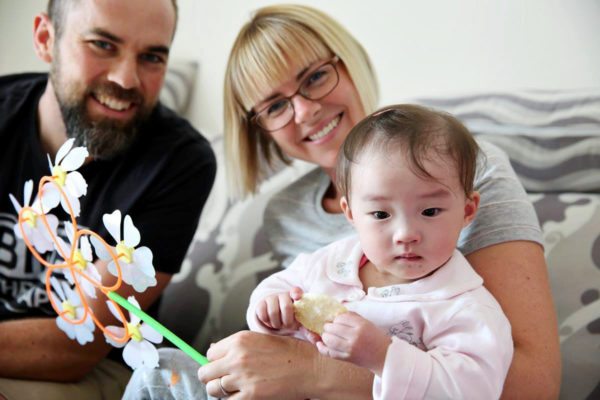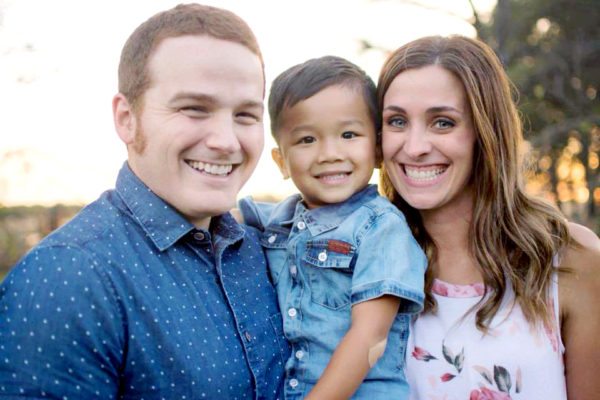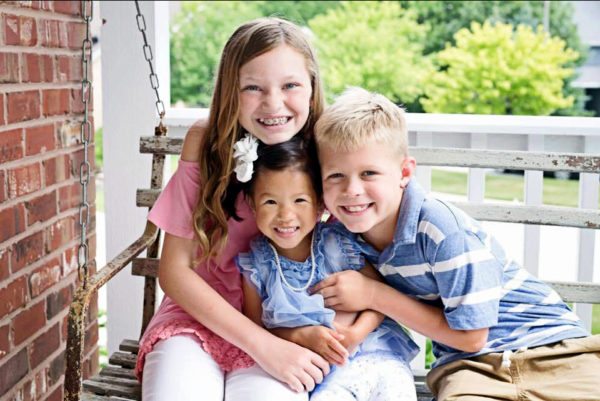You’ve dreamt for this day for months, years even. Planned for it, traveled halfway around the world for it and played it out in your mind a million times. And yet, the reality of becoming a family through adoption is undoubtedly different.
What happens next depends much on how you, as the adoptive parent, process the discrepancy between expectation and reality.
Do you take that initial rejection personally?
Do you panic at un-met milestones?
Does your commitment feel suffocating when the reality of orphanage life is staring you in the face?
Preparing for Adoption is our focus for the next two months. It is our hope to help you be as ready as possible for that day – the day you’ve waiting and longed for – and all the days to follow.

We recently had a chance to ask Sarah Hansen – MSW and Child Advocate at Madison Adoption Associates – some specific questions about adoption preparedness.
Q: What pre-adoption training does your agency require for adoptive families?
MAA: In addition to the standard 12 hours of pre-adoptive training that Hague requires, Madison Adoption Associates (MAA) also requires that Prospective Adoptive Parents (PAPs) read three books per parent, and submit book reports on each. MAA has also implemented a Special Circumstances curriculum, which must be completed by any family requesting a non-traditional adoption such as artificial twinning, displacing the oldest, or at MAA’s discretion. This ‘Special Circumstances curriculum’ is also in addition to the 12 Hague hours and three book reports per parent.
Q: How do you see pre-adoption training impacting families post-adoption?
MAA: We find that pre-adoptive training has a significant impact on families post-adoption. The more a family embraces the training process, and really ‘digs deep’ into it, the better off they are post-adoption.

Q: Do you see a correlation between pre-adoption parental preparedness and post-adoption parental satisfaction?
MAA: Not measurably, but anecdotally, yes. While all families complete all of our required training, our social workers and case workers can ascertain during the process as to whether or not the PAP(s) truly absorbed the training, or if they just ‘got through it’ to check it off the list. Those families who may not have taken the training seriously are more likely to be the ones surprised by challenges post-adoption.
Q: What do you do to help parents prepare their homes, other children and extended family members for a new child joining the family?
MAA: At MAA, we get to know our families well. Of course, if we are completing the home study for the PAP, our social workers are in the home, talking with each family member, going over training, talking about the specific medical needs the PAPs are open to, etc. If our social worker has any concerns, they are immediately addressed with the PAPs. Our goal is to prepare the PAPs as best we can, so sometimes we require a parenting course, or additional training, in order to feel confident that the PAPs are ready to adopt.
When MAA is not the home study agency, we work closely with the home study social worker to determine suitability of the PAPs. In addition, our case workers are in constant contact with the PAPs throughout the process, and multiple conversations are had centered around preparedness.
Q: What, if any, have you noticed to be the most significant hindrances to preparedness?
MAA: The biggest hindrance is PAPs trying to rush through the training in order to ‘check it off’ the list. The training is not meant to be ‘just another thing’ to have to do, but an ongoing process of learning. Not all PAPs are open to that ideology.
Q: What are some of the biggest challenges families face in-country?
MAA: Culture shock, illness, unmet expectations surrounding family day, excessive grieving or behavioral issues with the new child, unexpected special needs, sleep challenges.
Q: How do you prepare families for medical surprises?
MAA: As soon as a PAP is matched with their child, MAA conducts a counseling session specific to that child and his/her needs. During this conversation, additional medical needs are discussed. We require all PAPs to have files reviewed by medical professionals, and to receive counseling specific to the medical needs.
Q: How do you support families in-country?
MAA: MAA has staff on the ground in country. In addition, we connect with our families while they are in country to ensure that the process is going smoothly for them. If there are any concerns or issues, we are immediately in contact with our in-country staff to rectify the situation.

Q: What are some of the biggest challenges that families face post-adoption?
MAA: Adding a child to your family is a life changing event. And each family, and each child, are very different. Some families have a seamless adoption and transition into their ‘new normal’ very easily. Other families have growing pains. And few families have extremely significant challenges due to behaviors, post-adoption depression, attachment issues, or any other number of things.
Q: What post-adoption services do you offer families?
MAA: At MAA we connect with each and every family upon their return to the US with their new child. In addition to China’s post-adoption report requirements, we also require a 30-day post-adoption report. We find that it is imperative to success to have the family’s social worker visit them in those first few weeks, as those can be the most challenging.
When families express to MAA that they are struggling, we immediately get in touch with their home study agency in order to formulate a support plan. We stay in very regular contact with the family, and help them secure services and resources specific to their needs. In addition, we link families into state services where applicable.
Q: Are there additional factors, even beyond preparedness, which help adoptive families to succeed?
MAA: Connection to the adoption community is very helpful, especially for first time adoptive families. This helps to manage expectations about the adoption, and the experience, and has been beneficial to ‘ground’ the PAP in terms of what is ‘normal’ and to be expected.
Q: Disruption is obviously a huge issue, has your agency implemented anything that has helped reduce this heartbreaking reality?
MAA: The ‘Special Circumstances curriculum’ was implemented not necessarily because of a disruption, but as a preventative measure for higher risk placements. MAA recognizes that the picture of ‘the adopted child’ is much different than it was 3, 5, 8 years ago. The adopted child now is older, or has more significant special needs, than in years past, and it is our duty to prepare the PAPs as such.
While our disruption rate is extremely low, they do still happen. With each case, we go back to the beginning, and really dig deep to find where the break down may have occurred. Was it in pre-adoptive preparation? Was it during the in-country experience? Were there not enough supports offered once home? Etc, etc. And, after reviewing the entire case as a team and identifying potential areas of weakness, we then discuss ways to implement procedures to improve.
Q: What are some things an adoptive parent could be doing during the wait, on their own, to better prepare for the journey of adoption?
MAA: Read books, go to workshops and seminars, connect with the adoption community, stay connected with your social worker and placement agency. Do not focus so much on waiting for each step, but use that time to surround yourselves with education. And if, at any point during that self-enlightenment, you feel scared or ill-prepared, contact your agency immediately. We are here to help and support our PAPs, and the only way to truly do that is through open and honest communication.

Q: Can you share a list of recommended books, articles or videos for adoptive parents?
MAA: We’ve got a great list available on our website!
Q: What can the adoption community do to help better prepare, support and engage adopting families?
MAA: Be honest. Speak up. Encourage new PAPs to dig in deep, and expect the worst. Share the hard stories. Rejoice in the successes.
Q: What do you most want adoptive parents to know regarding adoption preparedness?
MAA: Adoption preparedness is possibly the most important part of your adoption journey. Please embrace it, and do not see it as “yet another thing on the list.” Open your mind to what you are learning. Ask the hard questions. Envision the worst case scenario.
Be just scared enough to continue to learn, but not too scared to still dive in head first. Your child needs this from you. They deserve it.
Thank you so much, Sarah, for your sharing about MAA and your work on behalf of the fatherless in China.


























Leave a Reply